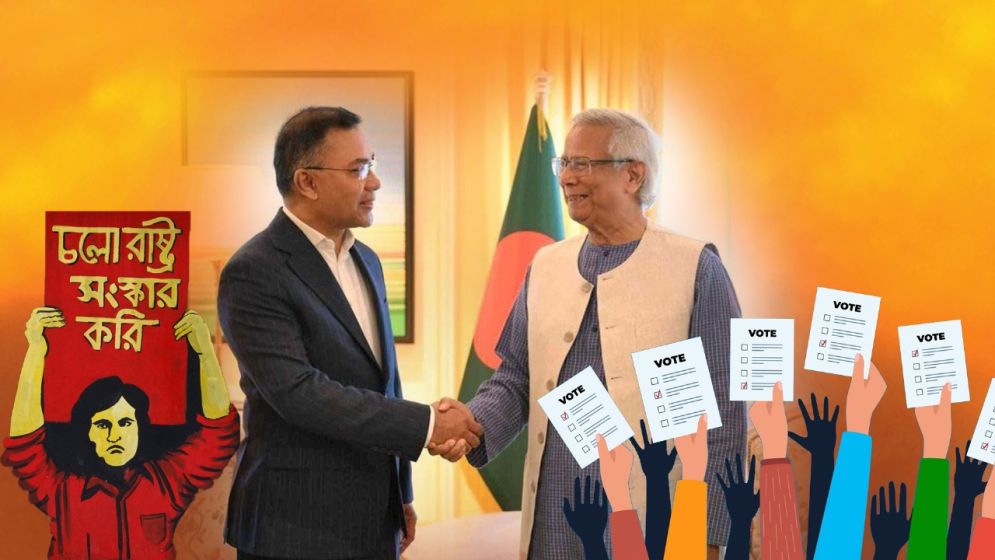On Friday, one London hotel suite became the center of Bangladeshi politics..

By any measure, Dr. Muhammad Yunus’s trip to London had the potential to mark a turning point for Bangladesh.
Let’s begin with the official purpose of Dr. Yunus’s London visit: for the first time in history, a sitting head of Bangladesh’s government was granted a ceremonial honor by the King of England along with other global celebrities like David Beckham and Kate Winslate–an event significant enough to justify the trip on its own.
Senior officials from both the UK and Bangladesh held discussions aimed at repatriating billions in laundered assets, looted during the days of the ousted Awami League regime.
In a coincidental but symbolic development, British authorities froze the assets of Saifuzzaman Chowdhury, a former Awami League minister accused of amassing over 600 luxury properties in the UK–allegedly with stolen Bangladeshi funds.
And yet, the headlines back home told a different story.
For three days, the media fixated not on statecraft or recovered fortunes, but on the venue of Dr. Yunus’s stay–the opulent Dorchester Hotel and its large bill. They speculated about his failure to secure a meeting with UK Prime Minister Keir Starmer and derided the visit as diplomatically hollow, lacking any “meaningful bilateral deal.”
When Yunus’s press secretary, Shafiqul Alam, noted that Starmer was “probably in Canada,” Bangladeshi outlets pounced–omitting the word “probably” and spinning the absence as a diplomatic slight.
But then came a meeting that reframed the entire visit.
In a tightly guarded 90-minute sit-down at the Dorchester, Dr. Yunus met with Tarique Rahman, the acting chairperson of the BNP–and arguably the most powerful political figure in Bangladesh today.
The mood was notably warm. Yunus was flanked by senior interim officials, including National Security Adviser Dr. Khalilur Rahman and Press Secretary Alam, lending the meeting a weight far beyond mere symbolism.
And a major breakthrough was achieved: consensus on an election timeline. Yunus conveyed that a national vote could be held before Ramadan–possibly as early as February 12, a date now circulating widely on Bangladeshi social media and news channels.
Earlier, Tarique Rahman proposed a pre-Ramadan timeline. Yunus, while standing by his earlier April proposal, signaled openness. If justice and reform processes showed credible progress, he said, a February vote might be “operationally feasible.”
Tarique welcomed the flexibility. Both sides appeared less concerned with a fixed date than with demonstrating momentum.
-684c414857508.jpeg)
A cordial meet
The political choreography was unmistakable. When Tarique stepped out of his car, greeted by interim officials and waving confidently to BNP supporters gathered across Park Lane, the signal was clear: this was a meeting of consequence.
Inside the Dorchester’s private meeting suite–snippets of which quickly flooded social media–Dr. Yunus opened with small talk in the classic British register, noting the weather.
Tarique Rahman, a seasoned Londoner after nearly two decades in exile, responded in kind. Then came pleasantries and formalities. He passed along greetings from his mother, former Prime Minister Khaleda Zia. Yunus, smiling, nodded his thanks.
It was a rare image: the Nobel laureate and the heir-apparent to Bangladesh’s political future, seated together, not as adversaries or strangers, but as equals. Their meeting appeared to immediately shift the mood of a country teetering on the edge of political paralysis.
Just days earlier, Bangladesh stood at an impasse. The BNP had insisted on a December election; Yunus, heading the interim government, had proposed April–a timeline announced, on the eve of Eid-ul-Azha.
With tensions rising and speculation swirling about unrest, many feared another descent into street-level chaos. The London meeting, however, recalibrated expectations. For now, confrontation has given way to cautious coordination.
What surprised observers most was Yunus’s tone after the meeting. Once famously skeptical of Bangladesh’s political class, the economist offered rare praise for Tarique Rahman.
According to sources in the meeting room, Yunus seemed “genuinely happy” by the 59-year-old’s command of political nuance, reform ideas, and policy detail. He reportedly remarked on Tarique’s “unexpected depth” and willingness to engage in institutional rebuilding.
Tarique, for his part, appeared to have prepared for this moment with care. After 15 years in political exile, he approached the meeting not as a firebrand, but as a statesman-in-waiting.
He sought Yunus’s counsel on matters of governance, discussed the mechanics of judicial and administrative reform, and referenced Yunus’s past interactions with his father, the late President Ziaur Rahman, who had once sought Yunus’s advice on rural decentralization.
-684c417806b18.jpeg)
A press brief after the meet
Following the high-stakes one-on-one, both delegations reconvened. National Security Adviser Dr. Khalilur Rahman and BNP Standing Committee member Amir Khosru Mahmud Chowdhury delivered a joint press briefing. The tone was conciliatory, even cautiously optimistic.
“The conversation took place in an exceptionally cordial environment,” read a joint statement. “Both parties reaffirmed their commitment to a timely and credible national election.”
While the specifics of the Yunus-Rahman private conversation remain undisclosed, senior officials hinted at broader alignment. Asked whether the proposed “July Charter”--an evolving framework for electoral and structural reforms–was discussed, Khosru confirmed it was “under active deliberation.”
“This is not a one-off fix,” he added. “We’re building a new Bangladesh. That requires continuity–before and after the vote.”
On Rahman’s return, BNP’s Amir Khosru was succinct: “There is no barrier. He will return when he deems the time appropriate.” The message was clear: the decision rests solely with Rahman—and the door is open.
On the thornier issue of justice, National Security Adviser Dr. Khalilur Rahman treaded carefully but deliberately. “Reform and justice are embedded in the joint framework,” he said. “We’re confident that significant progress will be visible before the election.” Khosru was more definitive: “It will be completed.”
When asked about demands from the newly formed National Consensus Party (NCP), which has threatened to boycott unless electoral reforms are frontloaded, both advisers sidestepped.
“That’s a question for the NCP,” Khalilur said. “But we want all parties on board.” The avoidance spoke volumes. While the interim government is eager to project unity, it remains uncertain whether that includes navigating the fractious demands of upstart players.
Perhaps the most telling moment came when speculation turned to whether the interim administration might walk back its April election timeline. “Our position is clear,” Khalilur said firmly. “If reforms and justice proceed on schedule, we’re open to a pre-Ramadan vote. That is not a deviation–it’s a potential adjustment within the existing roadmap.”
The press conference ended on an unusually synchronized note. Asked whether they were satisfied with the day’s outcomes, both advisers replied, almost in unison: “Absolutely satisfied.” Khalilur added, with an edge of finality, “If we weren’t, there would be no joint statement.”
—

